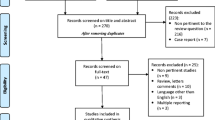Abstract
Background
After total mesorectal excision (TME) surgery, patients with an incomplete mesorectum have an increased risk of local and overall recurrence. With the introduction of laparoscopic TME, an improved quality of the specimen was expected. However, the quality-related results were comparable to the results after traditional open surgery. Transanal TME is a new technique in which the rectum is mobilised by using a single-port and endoscopic instruments through the so called ‘down to up’ procedure. This new technique potentially leads to an improved specimen quality. This study was designed to investigate the pathological quality of specimens after transanal (TME) and to compare these with specimens after traditional laparoscopic TME.
Methods
This matched case control study compared the specimens of a cohort of consecutive patients who underwent transanal TME with the specimens after traditional laparoscopic TME. The pathological quality of the mesorectum was determined by the definitions of Quirke as ‘complete’, ‘nearly complete’, or ‘incomplete’.
Results
From June 2012 until July 2013, 25 consecutive patients underwent transanal TME because of a rectum carcinoma. Within the transanal TME group, 96 % of the specimens had a complete mesorectum, while in the traditional laparoscopic group, 72 % was deemed complete (p < 0.05). Other pathological characteristics, such as the circumferential resection margin, were comparable between the two groups.
Conclusions
Transanal TME appears associated with a significant higher rate of completeness of the mesorectum. Further studies are necessary to evaluate this novel technique.
Similar content being viewed by others
References
Heald RJ, Husband EM, Ryall RD (1982) The mesorectum in rectal cancer surgery—the clue to pelvic recurrence? Br J Surg 69:613–616
Heald RJ, Ryall RD (1986) Recurrence and survival after total mesorectal excision for rectal cancer. Lancet 1:1479–1482
Nagtegaal ID, van de Velde CJ, van der Worp E, Kapiteijn E, Quirke P, van Krieken JH (2002) Macroscopic evaluation of rectal cancer resection specimen: clinical significance of the pathologist in quality control. J Clin Oncol 20:1729–1734
Bosch SL, Nagtegaal ID (2012) The importance of the pathologist’s role in assessment of the quality of the mesorectum. Curr Colorectal Cancer Rep 8:90–98
van der Pas MH, Haglind E, Cuesta MA, Furst A, Lacy AM, Hop WC, Bonjer HJ (2013) Laparoscopic versus open surgery for rectal cancer (COLOR II): short-term outcomes of a randomised, phase 3 trial. Lancet Oncol 14:210–218
Penninckx F, Kartheuser A, Van de Stadt J, Pattyn P, Mansvelt B, Bertrand C, Van Eycken E, Jegou D, Fieuws S (2013) Outcome following laparoscopic and open total mesorectal excision for rectal cancer. Br J Surg 100:1368–1375
Jayne DG, Thorpe HC, Copeland J, Quirke P, Brown JM, Guillou PJ (2010) Five-year follow-up of the medical research council CLASICC trial of laparoscopically assisted versus open surgery for colorectal cancer. Br J Surg 97:1638–1645
Velthuis S, van den Boezem PB, van der Peet DL, Cuesta MA, Sietses C (2013) Feasibility study of transanal total mesorectal excision. Br J Surg 100: 828–831; discussion 831
Kehlet H (1997) Multimodal approach to control postoperative pathophysiology and rehabilitation. Br J Anaesth 78:606–617
van den Boezem PB, Sietses C (2011) Single-incision laparoscopic colorectal surgery, experience with 50 consecutive cases. J Gastrointest Surg 15:1989–1994
Furst A, Schwandner O, Heiligensetzer A, Iesalnieks I, Agha A (2010) Laparoscopic TME in rectal cancer–electronic supplementary: op-video. Langenbecks Arch Surg 395:181–183
Quirke P, Durdey P, Dixon MF, Williams NS (1986) Local recurrence of rectal adenocarcinoma due to inadequate surgical resection. Histopathological study of lateral tumour spread and surgical excision. Lancet 2:996–999
Nagtegaal ID, Marijnen CA, Kranenbarg EK, van de Velde CJ, van Krieken JH (2002) Circumferential margin involvement is still an important predictor of local recurrence in rectal carcinoma: not one millimeter but two millimeters is the limit. Am J Surg Pathol 26:350–357
van Gijn W, Marijnen CA, Nagtegaal ID, Kranenbarg EM, Putter H, Wiggers T, Rutten HJ, Pahlman L, Glimelius B, van de Velde CJ (2011) Preoperative radiotherapy combined with total mesorectal excision for resectable rectal cancer: 12-year follow-up of the multicentre, randomised controlled TME trial. Lancet Oncol 12:575–582
Zorron R, Phillips HN, Coelho D, Flach L, Lemos FB, Vassallo RC (2012) Perirectal NOTES access: “down-to-up” total mesorectal excision for rectal cancer. Surg Innov 19:11–19
Breukink SO, Grond AJ, Pierie JP, Hoff C, Wiggers T, Meijerink WJ (2005) Laparoscopic versus open total mesorectal excision for rectal cancer: an evaluation of the mesorectum’s macroscopic quality. Surg Endosc 19:307–310
Heald RJ (2013) A new solution to some old problems: transanal TME. Tech Coloproctol 17:257–258
de Lacy AM, Rattner DW, Adelsdorfer C, Tasende MM, Fernandez M, Delgado S, Sylla P, Martinez-Palli G (2013) Transanal natural orifice transluminal endoscopic surgery (NOTES) rectal resection: “down-to-up’’ total mesorectal excision (TME)-short-term outcomes in the first 20 cases. Surg Endosc 27:3165–3172
Sylla P, Bordeianou LG, Berger D, Han KS, Lauwers GY, Sahani DV, Sbeih MA, Lacy AM, Rattner DW (2013) A pilot study of natural orifice transanal endoscopic total mesorectal excision with laparoscopic assistance for rectal cancer. Surg Endosc 27:3396–3405
Disclosures
Drs. Velthuis S, Drs. Nieuwenhuis DH, Dr. Ruijter TEG, Prof. Dr. Cuesta MA, Prof. Dr. Bonjer HJ, and Dr. Sietses C have no conflicts of interest or financial ties to disclose.
Author information
Authors and Affiliations
Corresponding author
Rights and permissions
About this article
Cite this article
Velthuis, S., Nieuwenhuis, D.H., Ruijter, T.E.G. et al. Transanal versus traditional laparoscopic total mesorectal excision for rectal carcinoma. Surg Endosc 28, 3494–3499 (2014). https://doi.org/10.1007/s00464-014-3636-1
Received:
Accepted:
Published:
Issue Date:
DOI: https://doi.org/10.1007/s00464-014-3636-1



